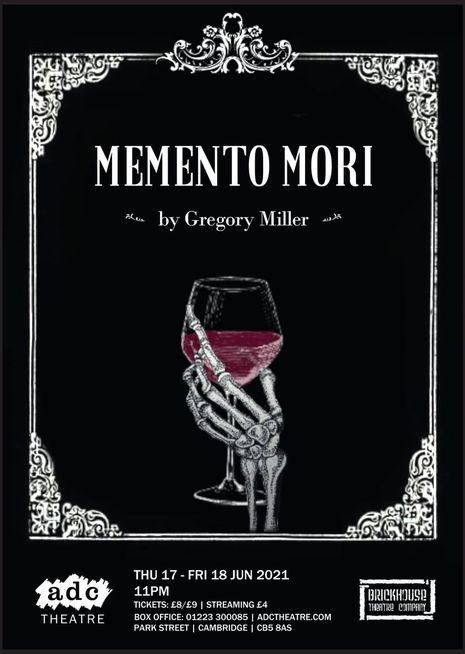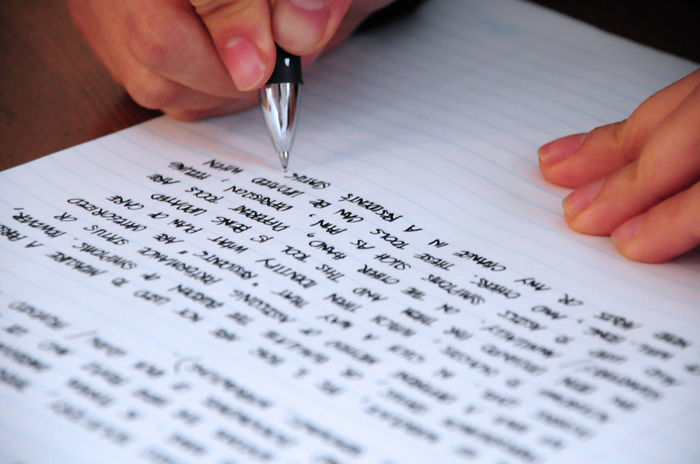Memento Mori has plenty of laughs but struggled for definition
Jasmine Regan Feldman reviews Memento Mori, a piece of new student writing

After a twenty-minute-long queue in the rain, the audience finally filed into the ADC theatre, but the wet had not quite dampened their spirits as excitement for Momento Mori buzzed around me. We eventually took our seats a little after the starting time of 11 p.m., bathed in a red glow that refracted through the droplets on my glasses. Wiping them, I could see the stage a little more clearly - it was simply decorated with a few choice pieces of period furniture that gave the illusion of a stately house. The setting evoked the dark atmosphere that writer Gregory Miller was clearly attempting to create after naming his play the grizzly-sounding Memento Mori.
Miller writes that he was attempting to pay homage to the Tudor playwright, Ben Jonson, by channelling the themes and dramatics of English renaissance literature. The characters and the plot mimicked the late seventeenth-century Shakespearean era of storytelling, featuring eccentric merchants, twisted lovers, and a malevolent comedy-duo, perhaps why the modern dialogue and jokes often felt mismatched with the RSC-style delivery. Although the audience apparently seemed to enjoy the comedy, one member in particular almost stealing the show with their misplaced cackles alone, the writing felt occasionally dated and uninspiring. Miller has not quite managed to bring a 17th-century play in to the 21st, but instead created a sort of shadow of Jonson's work. If Miller's goal was to recreate a renaissance theatre experience, Momento Mori is a good attempt but lacks the eloquence that would have sold a period piece.
“the modern dialogue and jokes often felt mismatched with the RSC-style delivery”
While the lines were not always fantastic, the actor's deliveries caused the audience to regularly explode into laughter. Jenrick was the stand-out performer, whose regular and well-timed moans and sighs meant his centrality to the themes would not be quickly forgotten by the audience.
Although the rain had created a good atmosphere for Momento Mori, it was also an unfortunate omen of disappointment. The posters and previews excited me to see the play, but I left feeling a bit unsatisfied and honestly mildly confused. From the title Momento Mori, one would expect the story to explore and examine the theme of death far more closely. Apart from Jenrick's desire for death and the character deaths, I felt the play seemed to focus on classism and sexism, but without a definite setting in time, these ideas hang suspended in time immemorial and can't be closely examined through a particular period lens. Jenrick's philosophical laments about dying were shallow without a real investigation of the themes through character development or in-depth discussions.
Overall, Momento Mori struggles to live up to its title since I was not really reminded much of death by the visual or metaphorical imagery of the play. Several times, I was unsure what sort of play Memento Mori wanted to be - a dark thriller or British farse? Unfortunately, it seemed to cross into the latter more than the former but was also not witty enough to embody the genre. I think if Miller had committed to either creating a Ben Jonson renaissance piece or revolutionising the period genre, Memento Mori would have been more successful, but it, unfortunately, is left in a somewhat confusing middle-ground. While Memento Mori may have fallen short of expectations, I look forward to seeing more of his work, especially if he fully commits to the period piece.
 News / Eight Cambridge researchers awarded €17m in ERC research grants27 December 2025
News / Eight Cambridge researchers awarded €17m in ERC research grants27 December 2025 News / News in Brief: carols, card games, and canine calamities28 December 2025
News / News in Brief: carols, card games, and canine calamities28 December 2025 News / Caius mourns its tree-mendous loss23 December 2025
News / Caius mourns its tree-mendous loss23 December 2025 News / Clare Hall spent over £500k opposing busway 24 December 2025
News / Clare Hall spent over £500k opposing busway 24 December 2025 Interviews / Meet Juan Michel, Cambridge’s multilingual musician29 December 2025
Interviews / Meet Juan Michel, Cambridge’s multilingual musician29 December 2025









